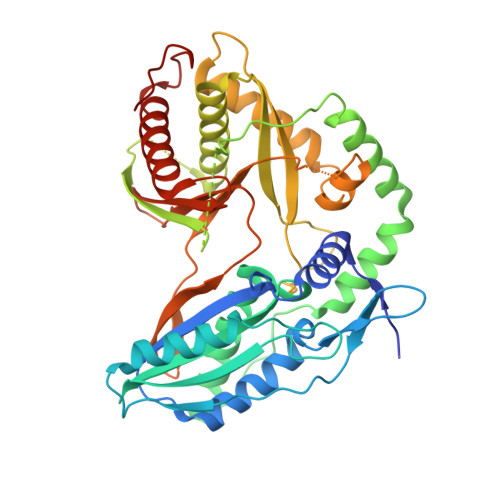Engineering and elucidation of the lipoinitiation process in nonribosomal peptide biosynthesis.
Zhong, L., Diao, X., Zhang, N., Li, F., Zhou, H., Chen, H., Bai, X., Ren, X., Zhang, Y., Wu, D., Bian, X.(2021) Nat Commun 12: 296-296
- PubMed: 33436600
- DOI: https://doi.org/10.1038/s41467-020-20548-8
- Primary Citation of Related Structures:
7C1H, 7C1K, 7C1L, 7C1P, 7C1R, 7C1S, 7C1U - PubMed Abstract:
Nonribosomal peptide synthetases containing starter condensation domains direct the biosynthesis of nonribosomal lipopeptides, which generally exhibit wide bioactivities. The acyl chain has strong impacts on bioactivity and toxicity, but the lack of an in-depth understanding of starter condensation domain-mediated lipoinitiation limits the bioengineering of NRPSs to obtain novel derivatives with desired acyl chains. Here, we show that the acyl chains of the lipopeptides rhizomide, holrhizin, and glidobactin were modified by engineering the starter condensation domain, suggesting a workable approach to change the acyl chain. Based on the structure of the mutated starter condensation domain of rhizomide biosynthetic enzyme RzmA in complex with octanoyl-CoA and related point mutation experiments, we identify a set of residues responsible for the selectivity of substrate acyl chains and extend the acyl chains from acetyl to palmitoyl. Furthermore, we illustrate three possible conformational states of starter condensation domains during the reaction cycle of the lipoinitiation process. Our studies provide further insights into the mechanism of lipoinitiation and the engineering of nonribosomal peptide synthetases.
Organizational Affiliation:
Helmholtz International Lab for Anti-Infectives, Shandong University-Helmholtz Institute of Biotechnology, State Key Laboratory of Microbial Technology, Shandong University, Qingdao, Shandong, 266237, China.














